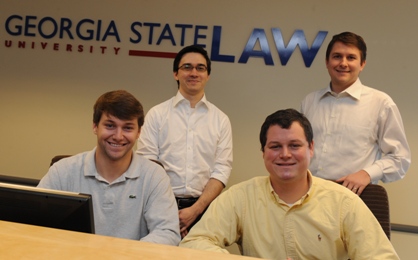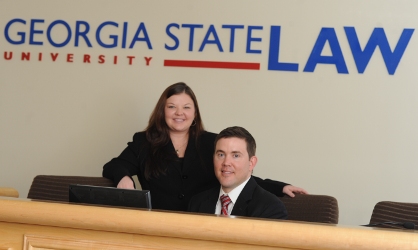Center for Law, Health & Society | News and Events | Center News | 2011 Archive | Two Teams Advocated at National Health Law Moot Court Competition Two Teams Advocated at National Health Law Moot Court Competition
March 10, 2011
ATLANTA - The National Health Law Moot Court Competition, hosted annually by Southern Illinois University School of Law, enjoyed its largest number of participants to date. Over thirty teams from schools across the nation spent a chilly weekend in Carbondale, Illinois this past November, verbally sparring over a current and hotly contested health law issue.

The teams argued a hypothetical case before the U.S. Supreme Court involving a fictitious state’s "presumed consent" statute which gave county medical examiners the authority to remove corneal tissue from the eyes of a dead person, provided no objection was on record. This issue pitted the full weight of a state’s police power against the constitutional safeguards provided by the first amendment and the due process clause.
Two teams from Georgia State Law attended the event this year. One team was sponsored by the Student Health Law Association (SHLA), and the other team consisted of members of the school’s Moot Court program. Coached by Raymond Lindholm (3L), who is a SHLA member, the Moot Court team included Chad Brock (2L), Charles Carmichael (2L), and Brian Klein (2L). The SHLA team was coached by Megan Daugherty (2L), who is SHLA’s president, and included Chelsea Murphy (2L), David Rhodes (2L), and Michael Oldham (3L).
Both teams represented the GSU College of Law with distinction. Michael Oldham, arguing both on and off brief for his team, placed 10th overall in the individual oralist category. Both teams received high marks for their written briefs, and enjoyed debating the relevant and challenging issue of how to address our nation’s organ procurement shortages.
 It is well known that one of Georgia State Law’s many strengths is its diverse and well-experienced student body. Chelsea Murphy, a second-year law student who has worked as a registered nurse in an emergency room setting for over four years and continues to do so while attending law school full time, was particularly passionate about this issue. "I was really shocked that this ’fictitious statute’ was actually on the books in some shape or form in many states. As someone who works in the emergency room, I was very sympathetic to the plaintiff in our problem," said Murphy.
It is well known that one of Georgia State Law’s many strengths is its diverse and well-experienced student body. Chelsea Murphy, a second-year law student who has worked as a registered nurse in an emergency room setting for over four years and continues to do so while attending law school full time, was particularly passionate about this issue. "I was really shocked that this ’fictitious statute’ was actually on the books in some shape or form in many states. As someone who works in the emergency room, I was very sympathetic to the plaintiff in our problem," said Murphy.
The plaintiff was the mother of a young boy who had been injured in an auto accident and pronounced dead soon after arriving at the hospital. "Essentially the statute placed the burden on her to provide notice to the hospital that she did not wish her son to be an organ donor, but provided no instruction on how to do so," said Murphy. "For me, the shortcomings of the statute were clear-cut."
 Health law attorneys, professors, and alumni volunteered to help bench the teams before they went to the competition. These practices culminated in two final practice rounds hosted at Nelson Mullins Riley & Scarborough, LLP and McKenna Long & Aldridge, LLP. "The law students benefitted tremendously from the rigorous questioning by these experienced health law attorneys," said Lindholm, who coached the Moot Court team. "We are very grateful to them for being so generous with their time, and especially to Laurice Rutledge, J.D. 2010, an associate with McKenna Long, and to Jennifer Malinovsky, a health law partner with Nelson Mullins, who helped to coordinate the benching practices at their respective offices."
Health law attorneys, professors, and alumni volunteered to help bench the teams before they went to the competition. These practices culminated in two final practice rounds hosted at Nelson Mullins Riley & Scarborough, LLP and McKenna Long & Aldridge, LLP. "The law students benefitted tremendously from the rigorous questioning by these experienced health law attorneys," said Lindholm, who coached the Moot Court team. "We are very grateful to them for being so generous with their time, and especially to Laurice Rutledge, J.D. 2010, an associate with McKenna Long, and to Jennifer Malinovsky, a health law partner with Nelson Mullins, who helped to coordinate the benching practices at their respective offices."
The number of law schools participating in the National Health Law Moot Court Competition has grown each year for the past decade for good reason. The experience provides law students the unique opportunity to hone their litigation skills on subject matter pulled from one of the fastest growing sectors of the U.S economy. Georgia State Law is proud of its 2010 NHLMC participants.